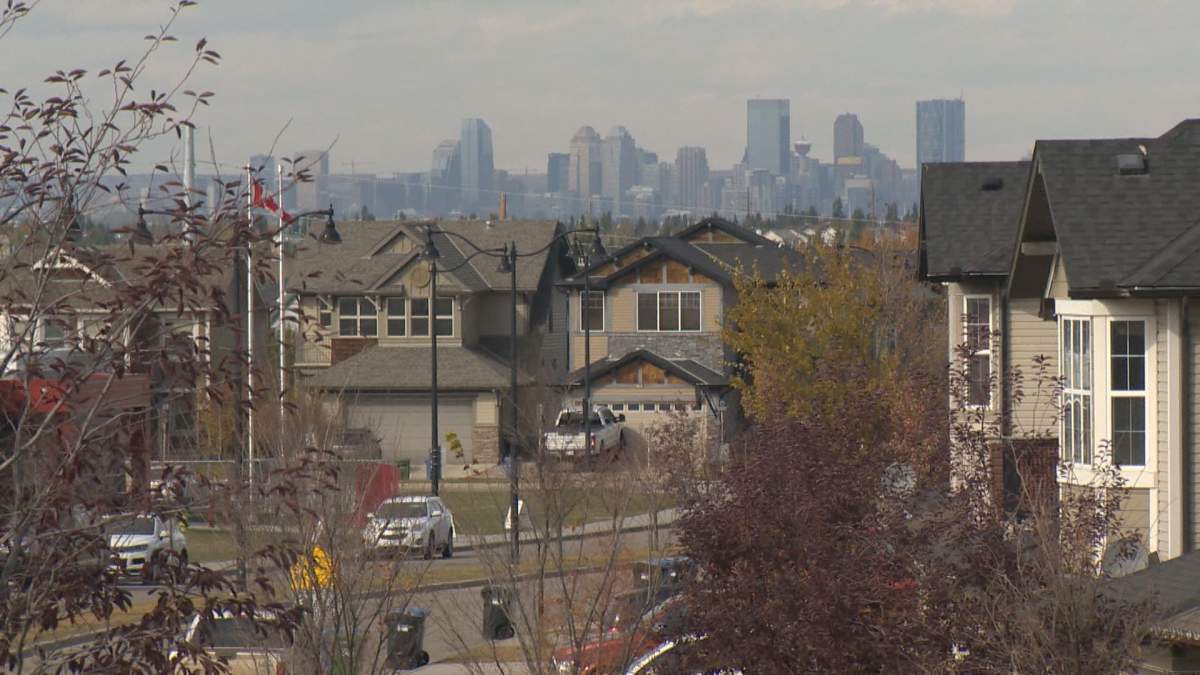Calgary city councillors have narrowly voted to avoid changing the city’s tax distribution between residential and non-residential properties, which would have meant another increase on some homeowners’ property tax bills.

Right now, residential properties in Calgary pay 52 per cent of property taxes, with business and commercial properties paying the other 48 per cent.
Sticking with the status-quo share was one of three options presented to city council at Tuesday’s meeting.
The second option was to shift the tax share to 53 per cent residential and 47 per cent non-residential, which would add an extra $46 this year to the property tax bill of a median house worth $555,000.
The third option presented would be to move the tax share to 54 per cent residential and 46 per cent non-residential, and that would cost the same type of home another $93 on their property tax bill this year.
Some city councillors, like Ward 1 Coun. Sonya Sharp, felt it wasn’t the right time to add more to residential tax bills.
“You all see the same thing at the grocery store, on your bills, on your rent or mortgages, or childcare,” Sharp told council. “The cost of everything is going up and that includes property taxes, which we have already increased in November.
“In this environment, the only sensible move is to maintain status quo.”
City council voted 8-7 to maintain the status quo for this year, with Councillors Gian-Carlo Carra, Evan Spencer, Jasmine Mian, Courtney Walcott, Kourtney Penner, Peter Demong and Mayor Jyoti Gondek voting against.
The Calgary Chamber of Commerce has repeatedly advocated for city council to rebalance residential and non-residential taxes at a rate of two per cent per year over the next four years.

Get weekly money news
The chamber’s request would see 60 per cent of the tax share carried by residential properties, with the remaining 40 per cent covered by businesses by 2027.
According to the chamber, that rebalance would bring Calgary in line with other Canadian cities, and “bend the curve on an increasingly imbalanced property tax ratio between businesses and residents.”
The chamber said Calgary businesses paid 3.4 times more tax than residential homeowners in 2021 — a number the organization expects to climb to 4.26 in 2023.
In a statement, Chamber of Commerce president Deborah Yedlin said the business advocacy organization was disappointed in the decision to maintain the status-quo tax share.
“As the voice of business, we are disheartened by city council’s decision,” the statement said. “We are working to ensure Calgary is competitive, entrepreneurial and ripe with opportunity, however this decision runs counter to our identity of being ‘open for business.'”

The most recent shift to Calgary’s tax share was in 2019, following the impact of a significant reduction in downtown property values on the city’s tax revenue.
Gondek told council that a further shift in the tax share has been a part of the budget discussions since 2019, and that expert working groups said the proportionality needs to change.
“We have been talking about this for four full years,” Gondek said. “It ends up coming down to who’s going to do the right thing and who’s worried about how it looks.”
The mayor argued that there are around 14,000 non-residential properties in Calgary that make up 26 per cent of the total assessed value in the city and carry 48 per cent of the tax share.
Gondek said there are 531,000 residential properties that make up 74 per cent of the city’s assessed value, but only pay 52 per cent of the total tax share.
The mayor said Calgary is the worst among Canadian major cities when it comes to proportional share of property taxes, and urged city council to consider a shift.
“These are decisions that are difficult to make, but we also have the consider the economic well-being of our city,” Gondek said. “It is impossible to put out a mandate for economic development if we as governors don’t make strong decisions right here.”

The mayor also warned council that if the tax ratio climbs to five to one, there would be “provincial intervention.”
Calgary homeowners will not see an additional increase in their property tax bill over the estimated $10 per month extra for typical single-family homes approved in November’s budget.
City administration told council a decision was required ahead of March, so officials could prepare property tax bills to be mailed out in May.



Comments
Want to discuss? Please read our Commenting Policy first.